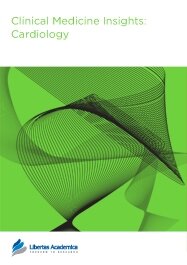

Publication Date: 20 Dec 2010
Type: Original Research
Journal: Clinical Medicine Insights: Cardiology
doi: 10.4137/CMC.S6493

Background: Use of the Amplatzer septal occluder (ASO) for the closure of secundum atrial septal defect (ASD) has recently become the procedure of choice, while earlier the only treatment for ASD was surgical closure. This study compares the right ventricular indices of the ASO group with the surgical closure group one year after intervention in adults.
Methods: From January 2008 to February 2010, 38 patients with isolated atrial septal defect of the secundum type one year after surgical (n = 20, age = 27 ± 4 years, 13 females, 7 males) or Amplatzer septal occluder closure (n = 18, age = 25 ± 4 years, 12 females, 6 males) were studied. At the same time, thirty-one age-matched normal subjects (age = 26 ± 6 years, 23 females, 9 males) were included as the control group. Strain and strain rate of the right ventricle were measured.
Results: The mean values of strain of the midportion were -26% ± 11.7%, -8.9% ± 4.2%, and 24.5% ± 7.4% (P < 0.001). Strain rates of the midportion were -2.19 ± 0.6 s-1, -1.2 ± 0.4 s-1, -1.9 ± 0.6 s-1
(P < 0.001) in ASO, surgery, and control groups, respectively.
Conclusion: This study showed that the right ventricle might show better performance in the ASO than the surgery group in adults with ASD in midterm follow-up.
PDF (499.60 KB PDF FORMAT)
RIS citation (ENDNOTE, REFERENCE MANAGER, PROCITE, REFWORKS)
BibTex citation (BIBDESK, LATEX)
XML
PMC HTML
Clinical Medicine Insights: Cardiology is very much conscious of time. Every step is done thoroughly and rapidly. The reviewers' comments are constructive. There is regular contact with the authors, providing explanations where necessary. The visibility also enjoyed by one's article once it is published is worthy of note. Thanks for making publishing with you so easy and enjoyable.

All authors are surveyed after their articles are published. Authors are asked to rate their experience in a variety of areas, and their responses help us to monitor our performance. Presented here are their responses in some key areas. No 'poor' or 'very poor' responses were received; these are represented in the 'other' category.See Our Results
Copyright © 2013 Libertas Academica Ltd (except open access articles and accompanying metadata and supplementary files.)
FacebookGoogle+Twitter
PinterestTumblrYouTube